The Effects of Globalisation on Hospitality Sector Jobs: Research
VerifiedAdded on 2020/10/22
|26
|5824
|392
Report
AI Summary
This report investigates the impact of globalisation on the hospitality sector, focusing on job creation and the evolving nature of work within the industry. The research utilizes a mixed methodology, including quantitative data analysis from surveys and qualitative thematic analysis. The study explores globalisation drivers, job roles, and the effects of technological advancements, cultural exchange, and economic factors. Key findings reveal the influence of globalisation on hospitality jobs, including the creation of new roles, changes in skill requirements, and the challenges posed by cultural and language barriers. The report also examines the strategies employed by hospitality organizations to navigate the global market, such as partnerships and technological innovation, and provides recommendations for future research and industry practices.
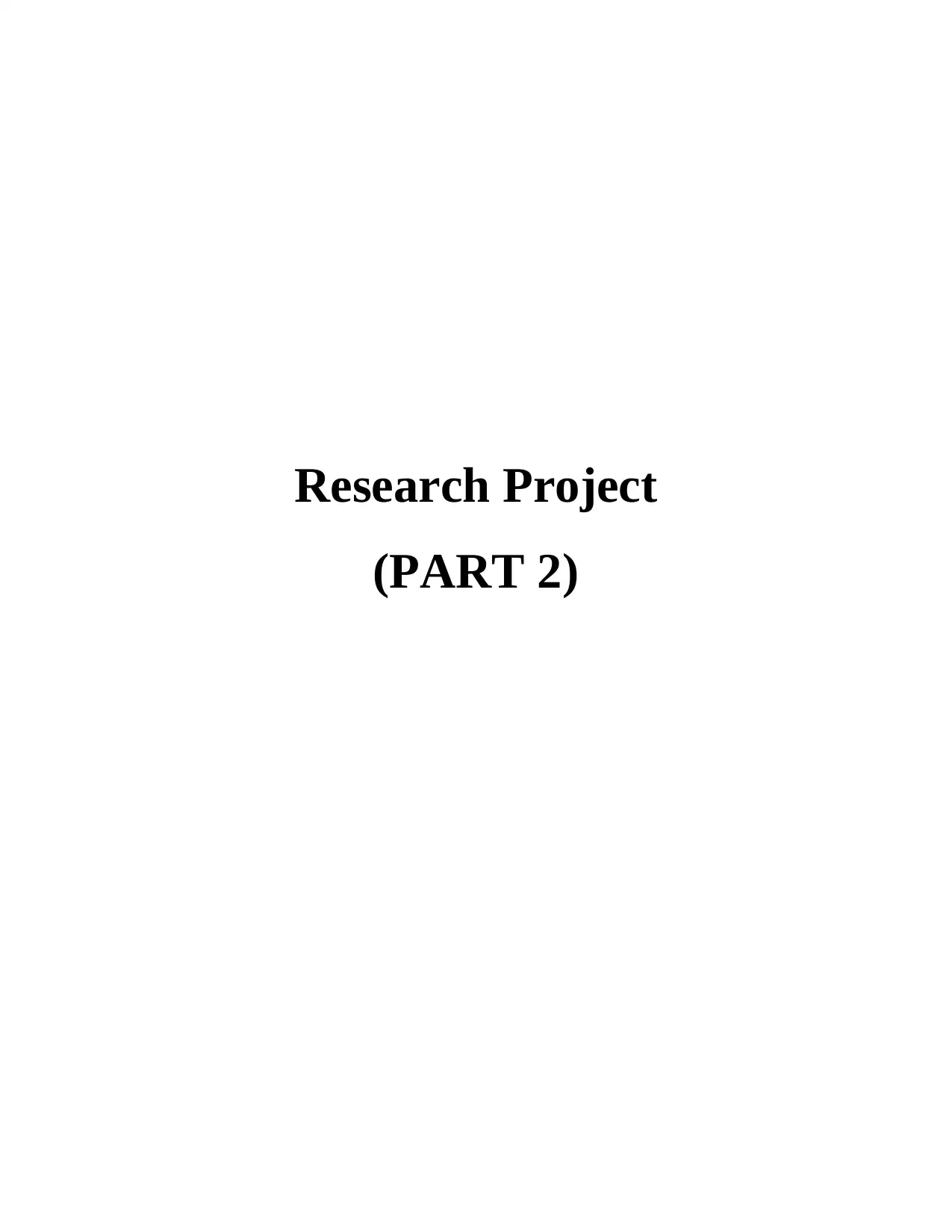
Research Project
(PART 2)
(PART 2)
Paraphrase This Document
Need a fresh take? Get an instant paraphrase of this document with our AI Paraphraser
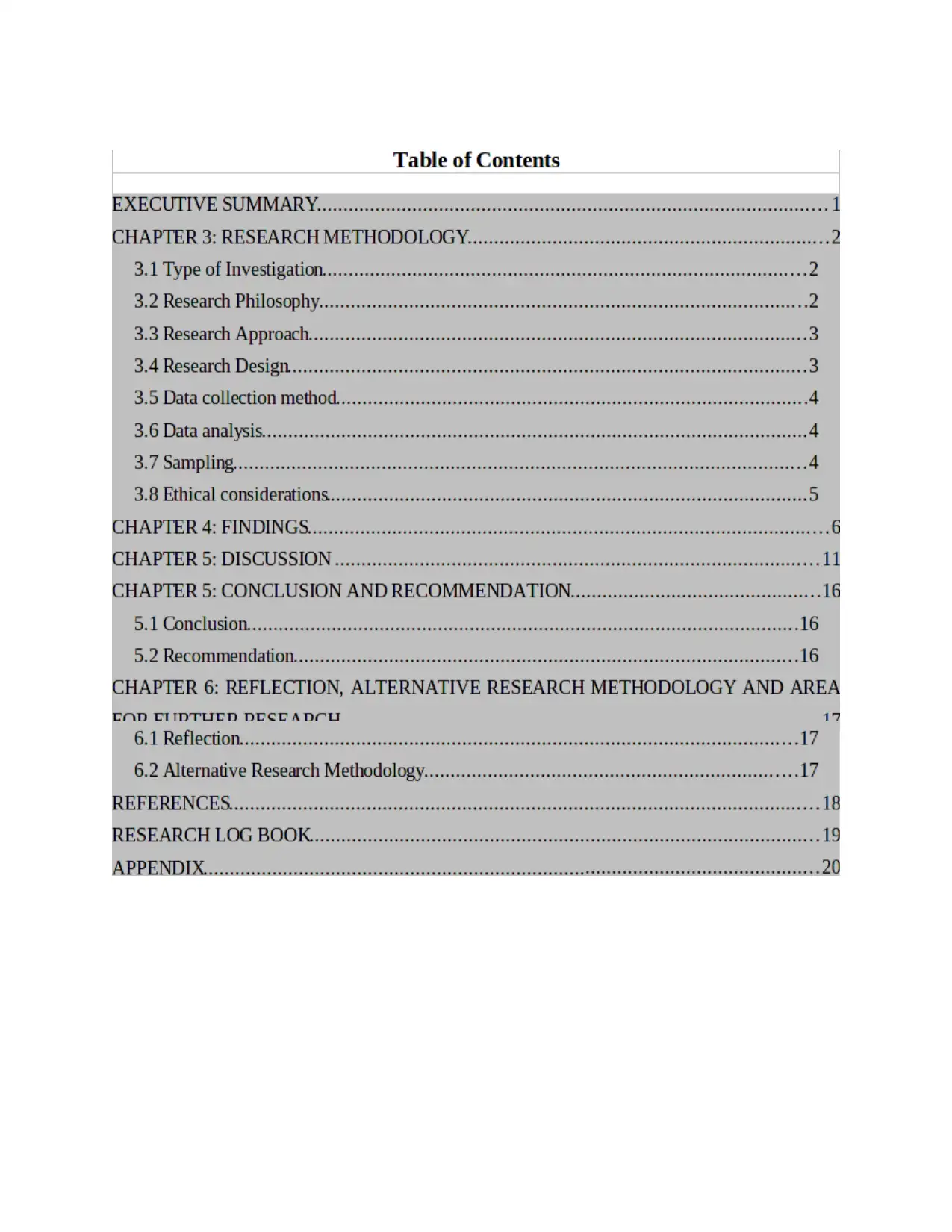
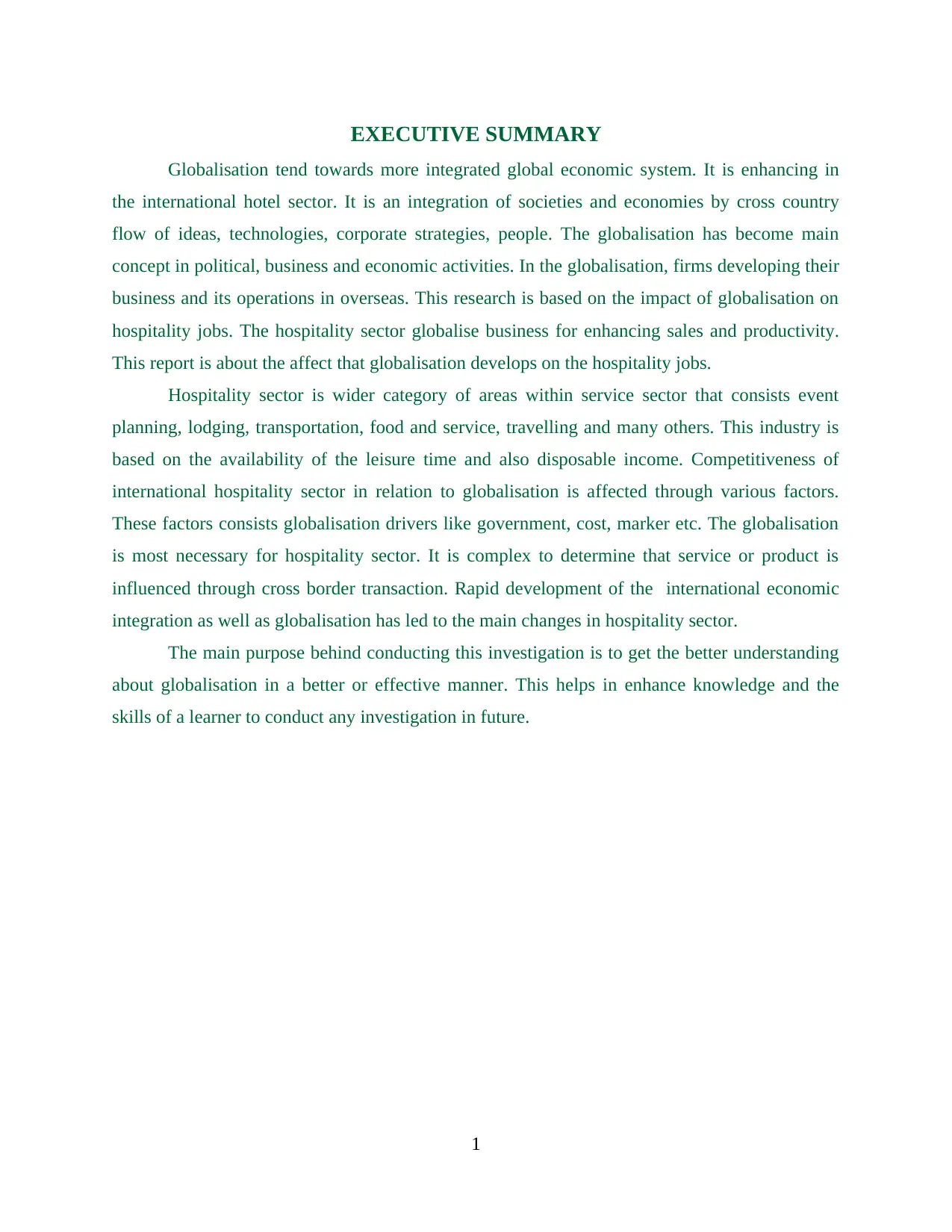
EXECUTIVE SUMMARY
Globalisation tend towards more integrated global economic system. It is enhancing in
the international hotel sector. It is an integration of societies and economies by cross country
flow of ideas, technologies, corporate strategies, people. The globalisation has become main
concept in political, business and economic activities. In the globalisation, firms developing their
business and its operations in overseas. This research is based on the impact of globalisation on
hospitality jobs. The hospitality sector globalise business for enhancing sales and productivity.
This report is about the affect that globalisation develops on the hospitality jobs.
Hospitality sector is wider category of areas within service sector that consists event
planning, lodging, transportation, food and service, travelling and many others. This industry is
based on the availability of the leisure time and also disposable income. Competitiveness of
international hospitality sector in relation to globalisation is affected through various factors.
These factors consists globalisation drivers like government, cost, marker etc. The globalisation
is most necessary for hospitality sector. It is complex to determine that service or product is
influenced through cross border transaction. Rapid development of the international economic
integration as well as globalisation has led to the main changes in hospitality sector.
The main purpose behind conducting this investigation is to get the better understanding
about globalisation in a better or effective manner. This helps in enhance knowledge and the
skills of a learner to conduct any investigation in future.
1
Globalisation tend towards more integrated global economic system. It is enhancing in
the international hotel sector. It is an integration of societies and economies by cross country
flow of ideas, technologies, corporate strategies, people. The globalisation has become main
concept in political, business and economic activities. In the globalisation, firms developing their
business and its operations in overseas. This research is based on the impact of globalisation on
hospitality jobs. The hospitality sector globalise business for enhancing sales and productivity.
This report is about the affect that globalisation develops on the hospitality jobs.
Hospitality sector is wider category of areas within service sector that consists event
planning, lodging, transportation, food and service, travelling and many others. This industry is
based on the availability of the leisure time and also disposable income. Competitiveness of
international hospitality sector in relation to globalisation is affected through various factors.
These factors consists globalisation drivers like government, cost, marker etc. The globalisation
is most necessary for hospitality sector. It is complex to determine that service or product is
influenced through cross border transaction. Rapid development of the international economic
integration as well as globalisation has led to the main changes in hospitality sector.
The main purpose behind conducting this investigation is to get the better understanding
about globalisation in a better or effective manner. This helps in enhance knowledge and the
skills of a learner to conduct any investigation in future.
1
⊘ This is a preview!⊘
Do you want full access?
Subscribe today to unlock all pages.

Trusted by 1+ million students worldwide
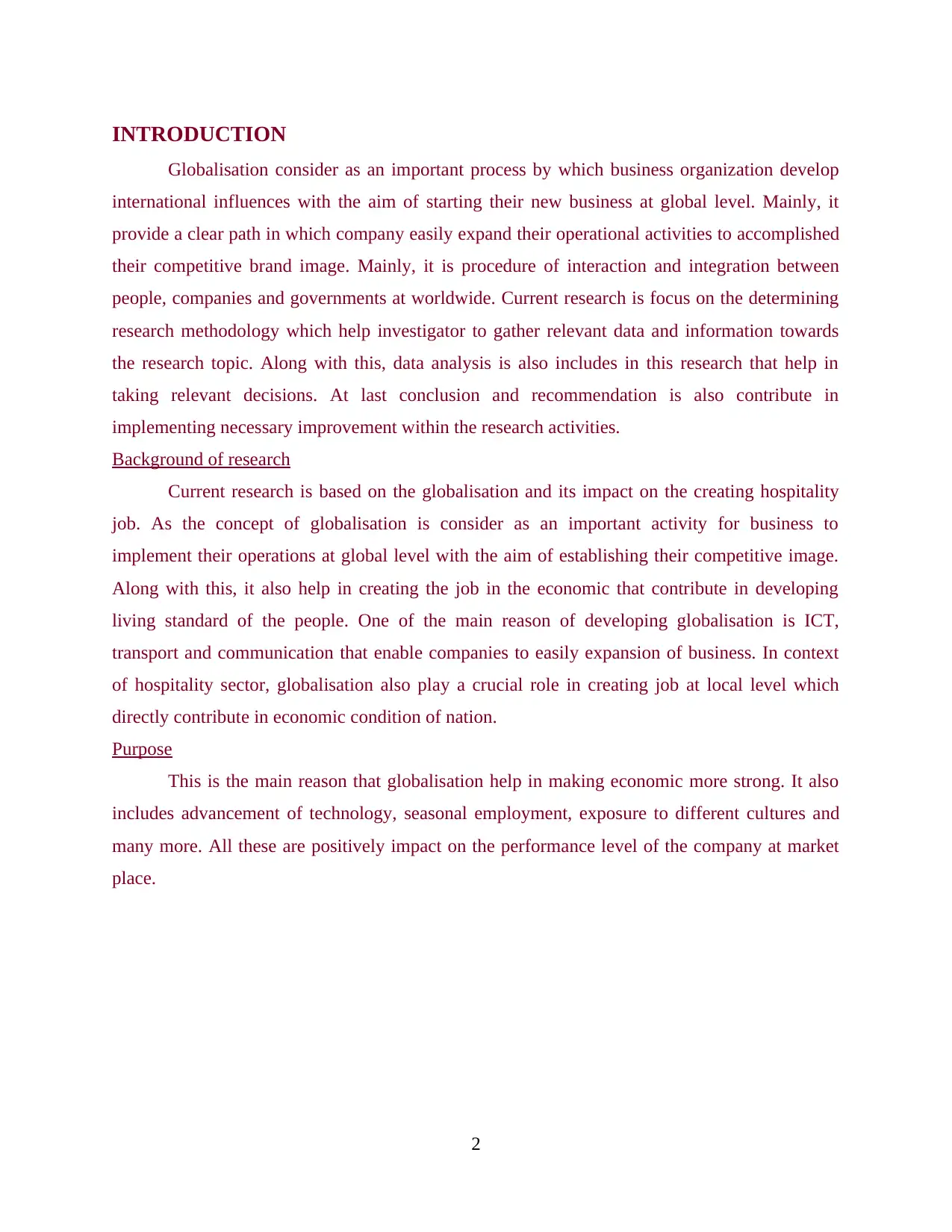
INTRODUCTION
Globalisation consider as an important process by which business organization develop
international influences with the aim of starting their new business at global level. Mainly, it
provide a clear path in which company easily expand their operational activities to accomplished
their competitive brand image. Mainly, it is procedure of interaction and integration between
people, companies and governments at worldwide. Current research is focus on the determining
research methodology which help investigator to gather relevant data and information towards
the research topic. Along with this, data analysis is also includes in this research that help in
taking relevant decisions. At last conclusion and recommendation is also contribute in
implementing necessary improvement within the research activities.
Background of research
Current research is based on the globalisation and its impact on the creating hospitality
job. As the concept of globalisation is consider as an important activity for business to
implement their operations at global level with the aim of establishing their competitive image.
Along with this, it also help in creating the job in the economic that contribute in developing
living standard of the people. One of the main reason of developing globalisation is ICT,
transport and communication that enable companies to easily expansion of business. In context
of hospitality sector, globalisation also play a crucial role in creating job at local level which
directly contribute in economic condition of nation.
Purpose
This is the main reason that globalisation help in making economic more strong. It also
includes advancement of technology, seasonal employment, exposure to different cultures and
many more. All these are positively impact on the performance level of the company at market
place.
2
Globalisation consider as an important process by which business organization develop
international influences with the aim of starting their new business at global level. Mainly, it
provide a clear path in which company easily expand their operational activities to accomplished
their competitive brand image. Mainly, it is procedure of interaction and integration between
people, companies and governments at worldwide. Current research is focus on the determining
research methodology which help investigator to gather relevant data and information towards
the research topic. Along with this, data analysis is also includes in this research that help in
taking relevant decisions. At last conclusion and recommendation is also contribute in
implementing necessary improvement within the research activities.
Background of research
Current research is based on the globalisation and its impact on the creating hospitality
job. As the concept of globalisation is consider as an important activity for business to
implement their operations at global level with the aim of establishing their competitive image.
Along with this, it also help in creating the job in the economic that contribute in developing
living standard of the people. One of the main reason of developing globalisation is ICT,
transport and communication that enable companies to easily expansion of business. In context
of hospitality sector, globalisation also play a crucial role in creating job at local level which
directly contribute in economic condition of nation.
Purpose
This is the main reason that globalisation help in making economic more strong. It also
includes advancement of technology, seasonal employment, exposure to different cultures and
many more. All these are positively impact on the performance level of the company at market
place.
2
Paraphrase This Document
Need a fresh take? Get an instant paraphrase of this document with our AI Paraphraser
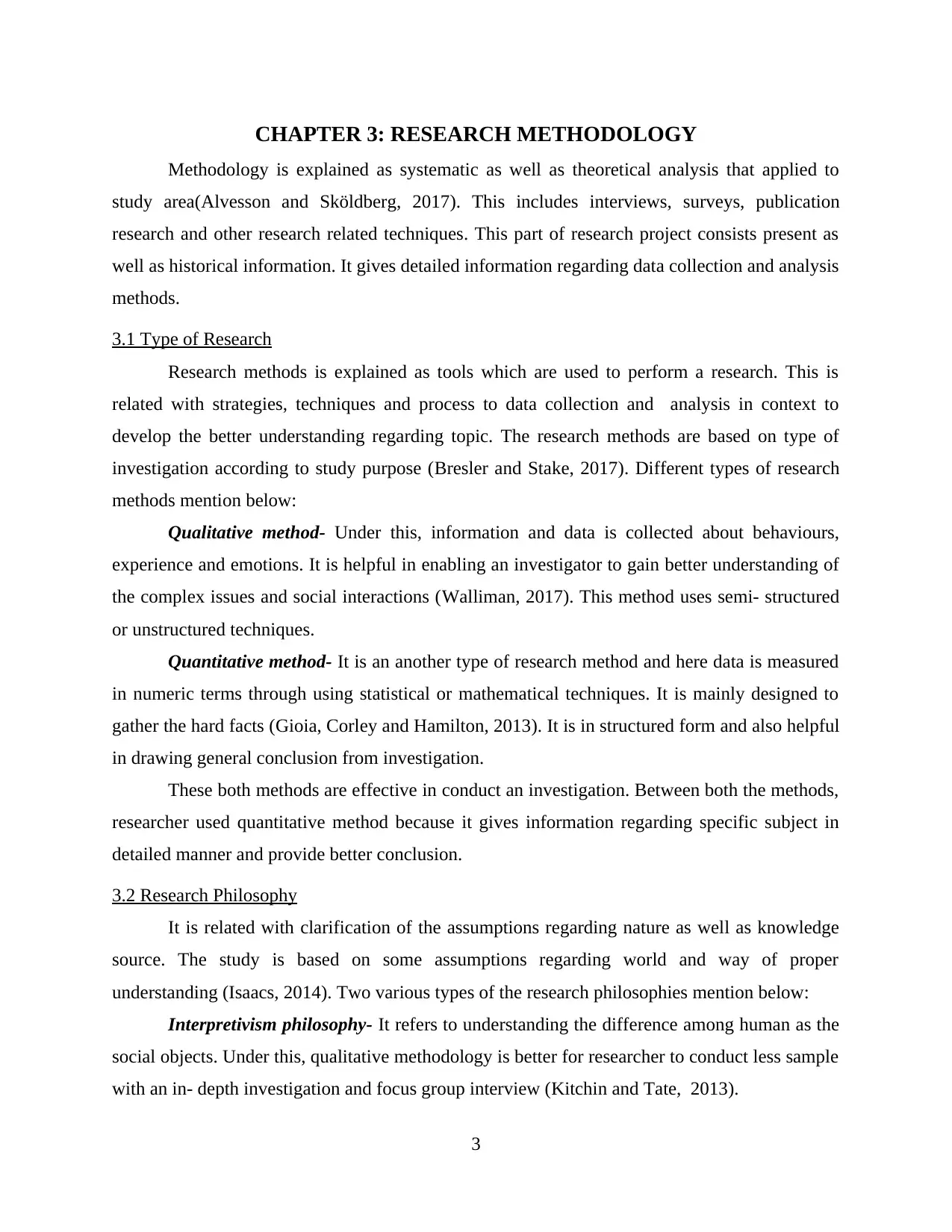
CHAPTER 3: RESEARCH METHODOLOGY
Methodology is explained as systematic as well as theoretical analysis that applied to
study area(Alvesson and Sköldberg, 2017). This includes interviews, surveys, publication
research and other research related techniques. This part of research project consists present as
well as historical information. It gives detailed information regarding data collection and analysis
methods.
3.1 Type of Research
Research methods is explained as tools which are used to perform a research. This is
related with strategies, techniques and process to data collection and analysis in context to
develop the better understanding regarding topic. The research methods are based on type of
investigation according to study purpose (Bresler and Stake, 2017). Different types of research
methods mention below:
Qualitative method- Under this, information and data is collected about behaviours,
experience and emotions. It is helpful in enabling an investigator to gain better understanding of
the complex issues and social interactions (Walliman, 2017). This method uses semi- structured
or unstructured techniques.
Quantitative method- It is an another type of research method and here data is measured
in numeric terms through using statistical or mathematical techniques. It is mainly designed to
gather the hard facts (Gioia, Corley and Hamilton, 2013). It is in structured form and also helpful
in drawing general conclusion from investigation.
These both methods are effective in conduct an investigation. Between both the methods,
researcher used quantitative method because it gives information regarding specific subject in
detailed manner and provide better conclusion.
3.2 Research Philosophy
It is related with clarification of the assumptions regarding nature as well as knowledge
source. The study is based on some assumptions regarding world and way of proper
understanding (Isaacs, 2014). Two various types of the research philosophies mention below:
Interpretivism philosophy- It refers to understanding the difference among human as the
social objects. Under this, qualitative methodology is better for researcher to conduct less sample
with an in- depth investigation and focus group interview (Kitchin and Tate, 2013).
3
Methodology is explained as systematic as well as theoretical analysis that applied to
study area(Alvesson and Sköldberg, 2017). This includes interviews, surveys, publication
research and other research related techniques. This part of research project consists present as
well as historical information. It gives detailed information regarding data collection and analysis
methods.
3.1 Type of Research
Research methods is explained as tools which are used to perform a research. This is
related with strategies, techniques and process to data collection and analysis in context to
develop the better understanding regarding topic. The research methods are based on type of
investigation according to study purpose (Bresler and Stake, 2017). Different types of research
methods mention below:
Qualitative method- Under this, information and data is collected about behaviours,
experience and emotions. It is helpful in enabling an investigator to gain better understanding of
the complex issues and social interactions (Walliman, 2017). This method uses semi- structured
or unstructured techniques.
Quantitative method- It is an another type of research method and here data is measured
in numeric terms through using statistical or mathematical techniques. It is mainly designed to
gather the hard facts (Gioia, Corley and Hamilton, 2013). It is in structured form and also helpful
in drawing general conclusion from investigation.
These both methods are effective in conduct an investigation. Between both the methods,
researcher used quantitative method because it gives information regarding specific subject in
detailed manner and provide better conclusion.
3.2 Research Philosophy
It is related with clarification of the assumptions regarding nature as well as knowledge
source. The study is based on some assumptions regarding world and way of proper
understanding (Isaacs, 2014). Two various types of the research philosophies mention below:
Interpretivism philosophy- It refers to understanding the difference among human as the
social objects. Under this, qualitative methodology is better for researcher to conduct less sample
with an in- depth investigation and focus group interview (Kitchin and Tate, 2013).
3
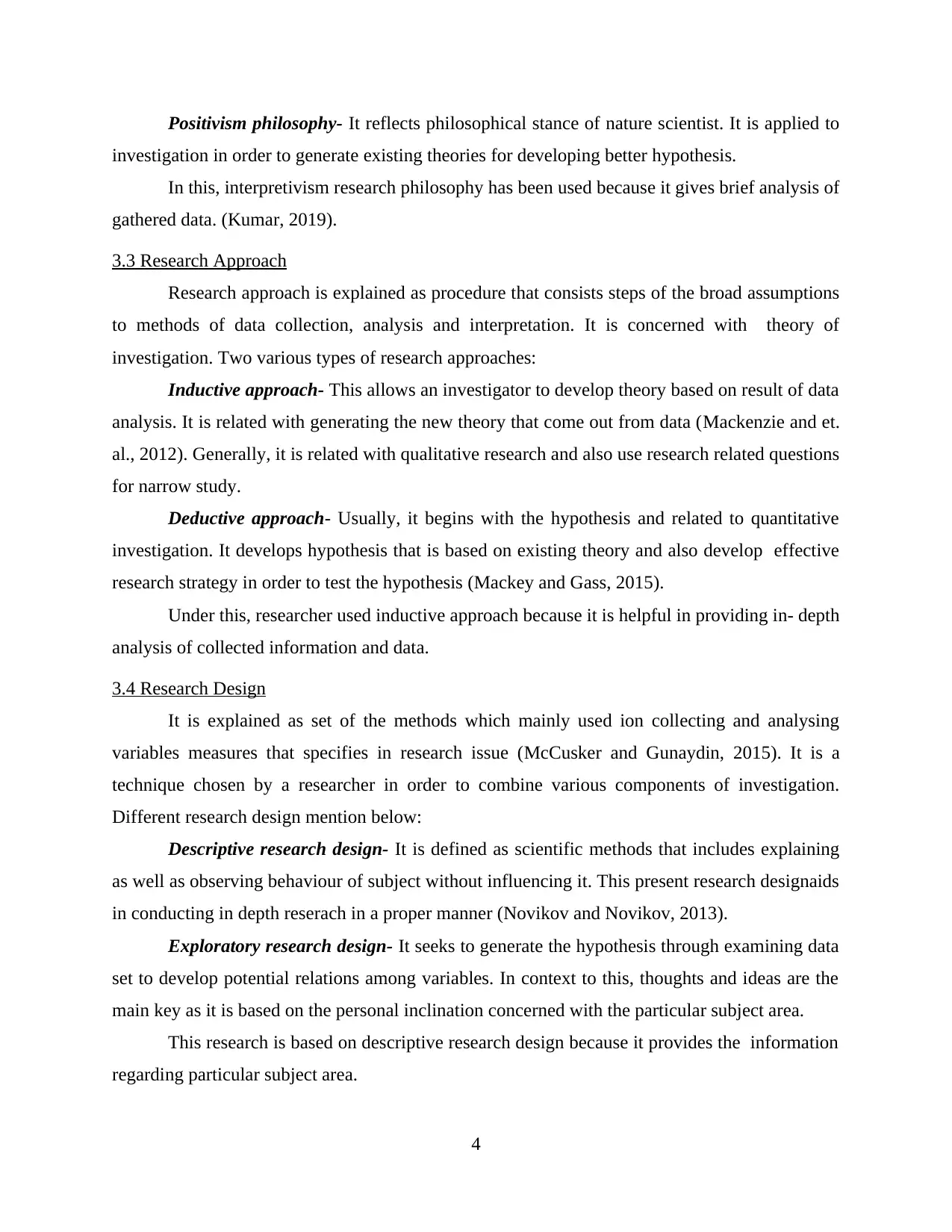
Positivism philosophy- It reflects philosophical stance of nature scientist. It is applied to
investigation in order to generate existing theories for developing better hypothesis.
In this, interpretivism research philosophy has been used because it gives brief analysis of
gathered data. (Kumar, 2019).
3.3 Research Approach
Research approach is explained as procedure that consists steps of the broad assumptions
to methods of data collection, analysis and interpretation. It is concerned with theory of
investigation. Two various types of research approaches:
Inductive approach- This allows an investigator to develop theory based on result of data
analysis. It is related with generating the new theory that come out from data (Mackenzie and et.
al., 2012). Generally, it is related with qualitative research and also use research related questions
for narrow study.
Deductive approach- Usually, it begins with the hypothesis and related to quantitative
investigation. It develops hypothesis that is based on existing theory and also develop effective
research strategy in order to test the hypothesis (Mackey and Gass, 2015).
Under this, researcher used inductive approach because it is helpful in providing in- depth
analysis of collected information and data.
3.4 Research Design
It is explained as set of the methods which mainly used ion collecting and analysing
variables measures that specifies in research issue (McCusker and Gunaydin, 2015). It is a
technique chosen by a researcher in order to combine various components of investigation.
Different research design mention below:
Descriptive research design- It is defined as scientific methods that includes explaining
as well as observing behaviour of subject without influencing it. This present research designaids
in conducting in depth reserach in a proper manner (Novikov and Novikov, 2013).
Exploratory research design- It seeks to generate the hypothesis through examining data
set to develop potential relations among variables. In context to this, thoughts and ideas are the
main key as it is based on the personal inclination concerned with the particular subject area.
This research is based on descriptive research design because it provides the information
regarding particular subject area.
4
investigation in order to generate existing theories for developing better hypothesis.
In this, interpretivism research philosophy has been used because it gives brief analysis of
gathered data. (Kumar, 2019).
3.3 Research Approach
Research approach is explained as procedure that consists steps of the broad assumptions
to methods of data collection, analysis and interpretation. It is concerned with theory of
investigation. Two various types of research approaches:
Inductive approach- This allows an investigator to develop theory based on result of data
analysis. It is related with generating the new theory that come out from data (Mackenzie and et.
al., 2012). Generally, it is related with qualitative research and also use research related questions
for narrow study.
Deductive approach- Usually, it begins with the hypothesis and related to quantitative
investigation. It develops hypothesis that is based on existing theory and also develop effective
research strategy in order to test the hypothesis (Mackey and Gass, 2015).
Under this, researcher used inductive approach because it is helpful in providing in- depth
analysis of collected information and data.
3.4 Research Design
It is explained as set of the methods which mainly used ion collecting and analysing
variables measures that specifies in research issue (McCusker and Gunaydin, 2015). It is a
technique chosen by a researcher in order to combine various components of investigation.
Different research design mention below:
Descriptive research design- It is defined as scientific methods that includes explaining
as well as observing behaviour of subject without influencing it. This present research designaids
in conducting in depth reserach in a proper manner (Novikov and Novikov, 2013).
Exploratory research design- It seeks to generate the hypothesis through examining data
set to develop potential relations among variables. In context to this, thoughts and ideas are the
main key as it is based on the personal inclination concerned with the particular subject area.
This research is based on descriptive research design because it provides the information
regarding particular subject area.
4
⊘ This is a preview!⊘
Do you want full access?
Subscribe today to unlock all pages.

Trusted by 1+ million students worldwide
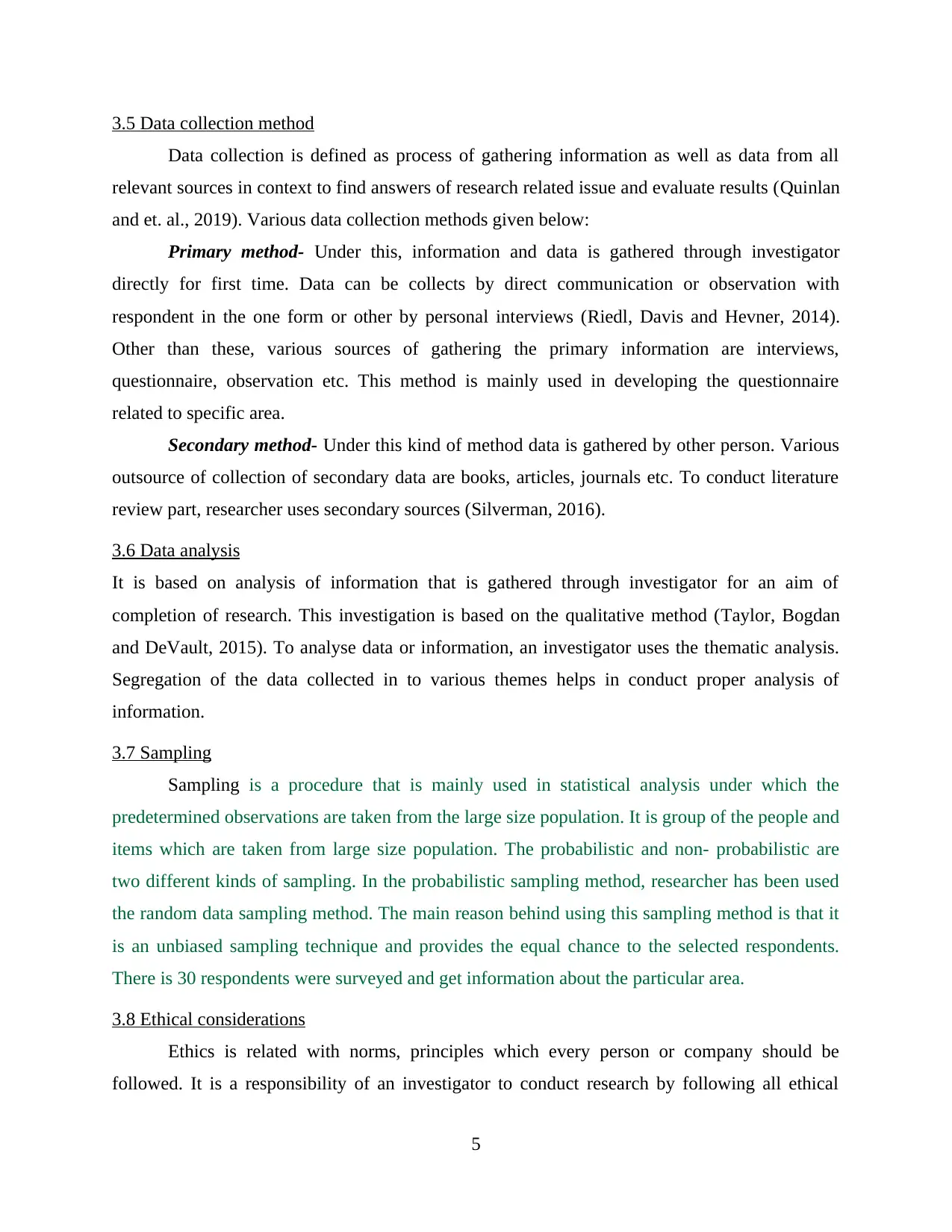
3.5 Data collection method
Data collection is defined as process of gathering information as well as data from all
relevant sources in context to find answers of research related issue and evaluate results (Quinlan
and et. al., 2019). Various data collection methods given below:
Primary method- Under this, information and data is gathered through investigator
directly for first time. Data can be collects by direct communication or observation with
respondent in the one form or other by personal interviews (Riedl, Davis and Hevner, 2014).
Other than these, various sources of gathering the primary information are interviews,
questionnaire, observation etc. This method is mainly used in developing the questionnaire
related to specific area.
Secondary method- Under this kind of method data is gathered by other person. Various
outsource of collection of secondary data are books, articles, journals etc. To conduct literature
review part, researcher uses secondary sources (Silverman, 2016).
3.6 Data analysis
It is based on analysis of information that is gathered through investigator for an aim of
completion of research. This investigation is based on the qualitative method (Taylor, Bogdan
and DeVault, 2015). To analyse data or information, an investigator uses the thematic analysis.
Segregation of the data collected in to various themes helps in conduct proper analysis of
information.
3.7 Sampling
Sampling is a procedure that is mainly used in statistical analysis under which the
predetermined observations are taken from the large size population. It is group of the people and
items which are taken from large size population. The probabilistic and non- probabilistic are
two different kinds of sampling. In the probabilistic sampling method, researcher has been used
the random data sampling method. The main reason behind using this sampling method is that it
is an unbiased sampling technique and provides the equal chance to the selected respondents.
There is 30 respondents were surveyed and get information about the particular area.
3.8 Ethical considerations
Ethics is related with norms, principles which every person or company should be
followed. It is a responsibility of an investigator to conduct research by following all ethical
5
Data collection is defined as process of gathering information as well as data from all
relevant sources in context to find answers of research related issue and evaluate results (Quinlan
and et. al., 2019). Various data collection methods given below:
Primary method- Under this, information and data is gathered through investigator
directly for first time. Data can be collects by direct communication or observation with
respondent in the one form or other by personal interviews (Riedl, Davis and Hevner, 2014).
Other than these, various sources of gathering the primary information are interviews,
questionnaire, observation etc. This method is mainly used in developing the questionnaire
related to specific area.
Secondary method- Under this kind of method data is gathered by other person. Various
outsource of collection of secondary data are books, articles, journals etc. To conduct literature
review part, researcher uses secondary sources (Silverman, 2016).
3.6 Data analysis
It is based on analysis of information that is gathered through investigator for an aim of
completion of research. This investigation is based on the qualitative method (Taylor, Bogdan
and DeVault, 2015). To analyse data or information, an investigator uses the thematic analysis.
Segregation of the data collected in to various themes helps in conduct proper analysis of
information.
3.7 Sampling
Sampling is a procedure that is mainly used in statistical analysis under which the
predetermined observations are taken from the large size population. It is group of the people and
items which are taken from large size population. The probabilistic and non- probabilistic are
two different kinds of sampling. In the probabilistic sampling method, researcher has been used
the random data sampling method. The main reason behind using this sampling method is that it
is an unbiased sampling technique and provides the equal chance to the selected respondents.
There is 30 respondents were surveyed and get information about the particular area.
3.8 Ethical considerations
Ethics is related with norms, principles which every person or company should be
followed. It is a responsibility of an investigator to conduct research by following all ethical
5
Paraphrase This Document
Need a fresh take? Get an instant paraphrase of this document with our AI Paraphraser
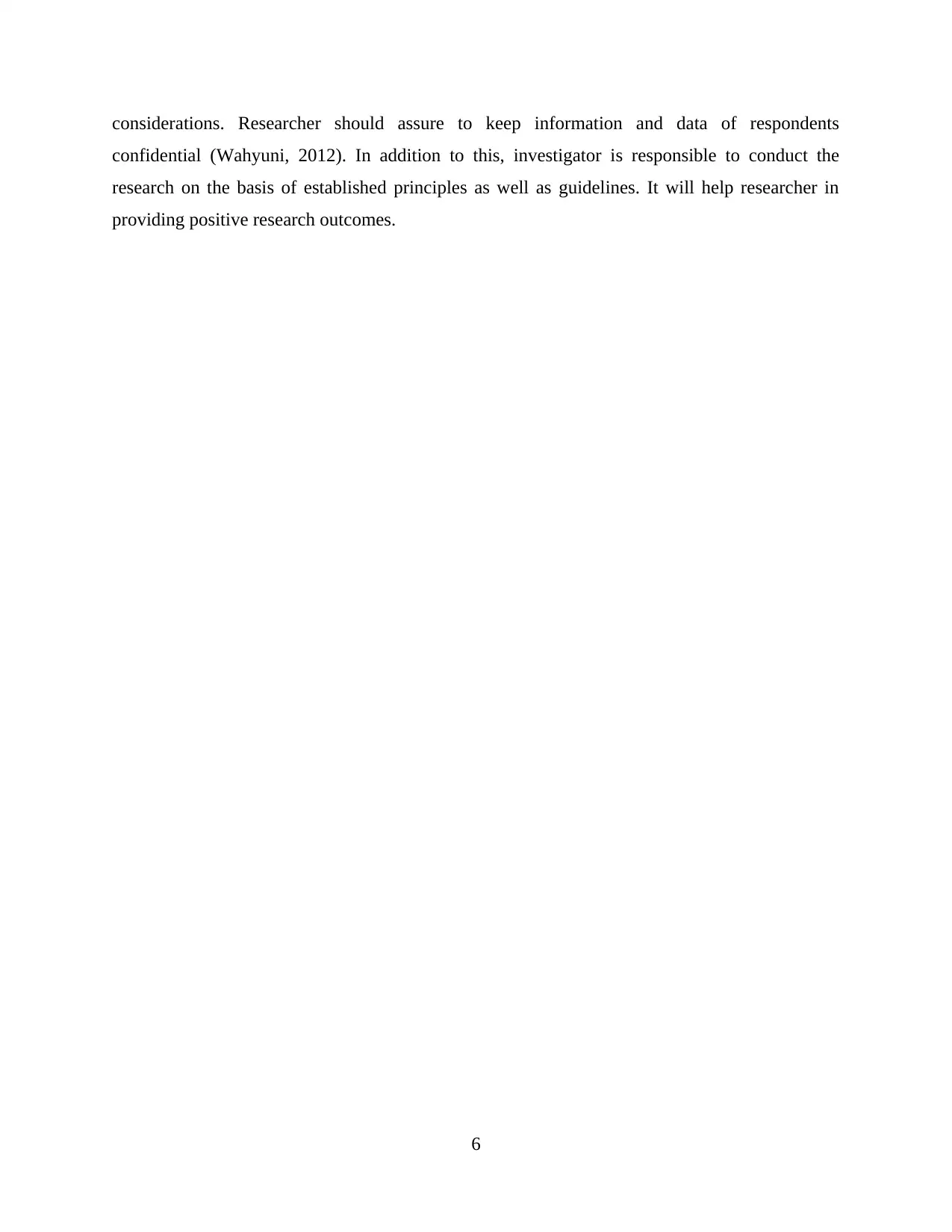
considerations. Researcher should assure to keep information and data of respondents
confidential (Wahyuni, 2012). In addition to this, investigator is responsible to conduct the
research on the basis of established principles as well as guidelines. It will help researcher in
providing positive research outcomes.
6
confidential (Wahyuni, 2012). In addition to this, investigator is responsible to conduct the
research on the basis of established principles as well as guidelines. It will help researcher in
providing positive research outcomes.
6
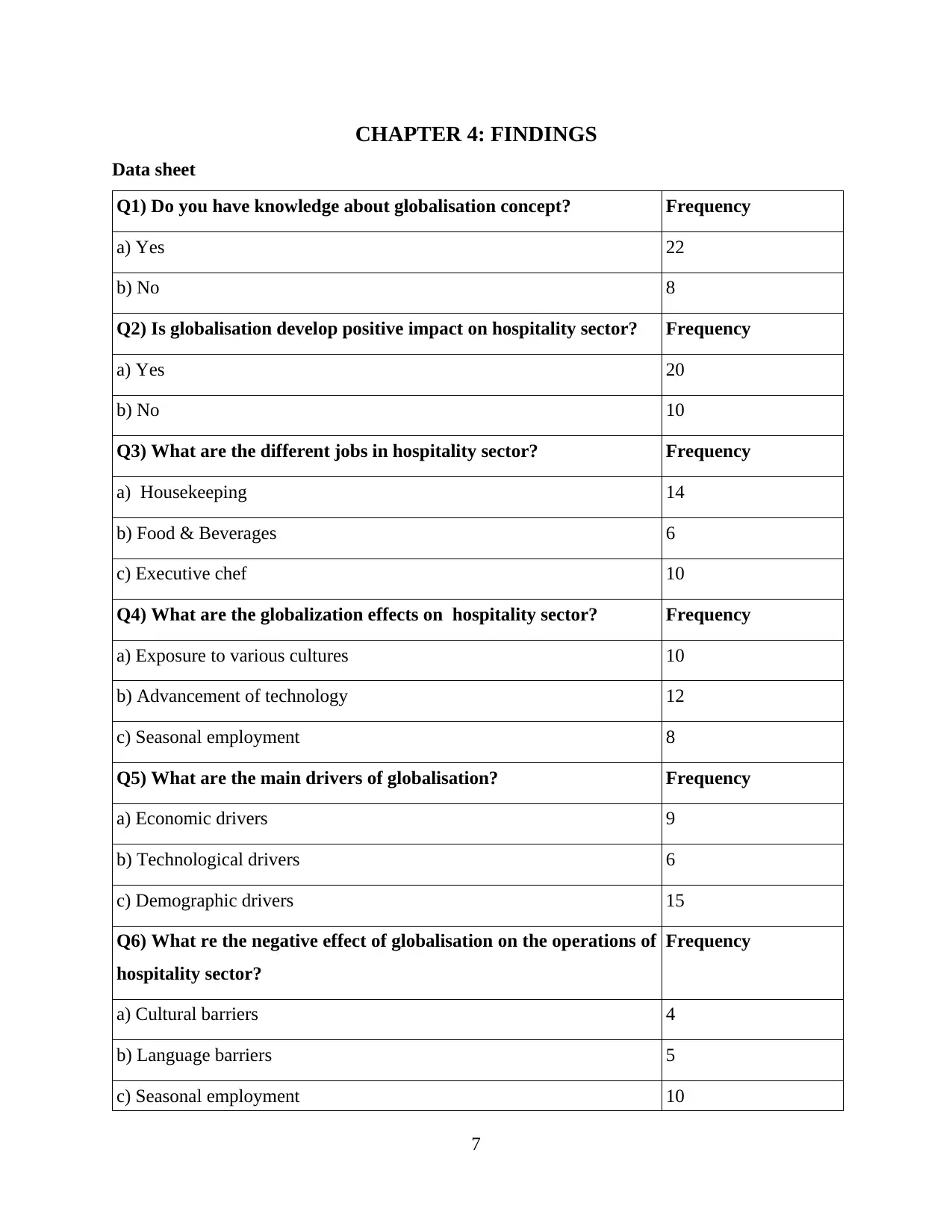
CHAPTER 4: FINDINGS
Data sheet
Q1) Do you have knowledge about globalisation concept? Frequency
a) Yes 22
b) No 8
Q2) Is globalisation develop positive impact on hospitality sector? Frequency
a) Yes 20
b) No 10
Q3) What are the different jobs in hospitality sector? Frequency
a) Housekeeping 14
b) Food & Beverages 6
c) Executive chef 10
Q4) What are the globalization effects on hospitality sector? Frequency
a) Exposure to various cultures 10
b) Advancement of technology 12
c) Seasonal employment 8
Q5) What are the main drivers of globalisation? Frequency
a) Economic drivers 9
b) Technological drivers 6
c) Demographic drivers 15
Q6) What re the negative effect of globalisation on the operations of
hospitality sector?
Frequency
a) Cultural barriers 4
b) Language barriers 5
c) Seasonal employment 10
7
Data sheet
Q1) Do you have knowledge about globalisation concept? Frequency
a) Yes 22
b) No 8
Q2) Is globalisation develop positive impact on hospitality sector? Frequency
a) Yes 20
b) No 10
Q3) What are the different jobs in hospitality sector? Frequency
a) Housekeeping 14
b) Food & Beverages 6
c) Executive chef 10
Q4) What are the globalization effects on hospitality sector? Frequency
a) Exposure to various cultures 10
b) Advancement of technology 12
c) Seasonal employment 8
Q5) What are the main drivers of globalisation? Frequency
a) Economic drivers 9
b) Technological drivers 6
c) Demographic drivers 15
Q6) What re the negative effect of globalisation on the operations of
hospitality sector?
Frequency
a) Cultural barriers 4
b) Language barriers 5
c) Seasonal employment 10
7
⊘ This is a preview!⊘
Do you want full access?
Subscribe today to unlock all pages.

Trusted by 1+ million students worldwide
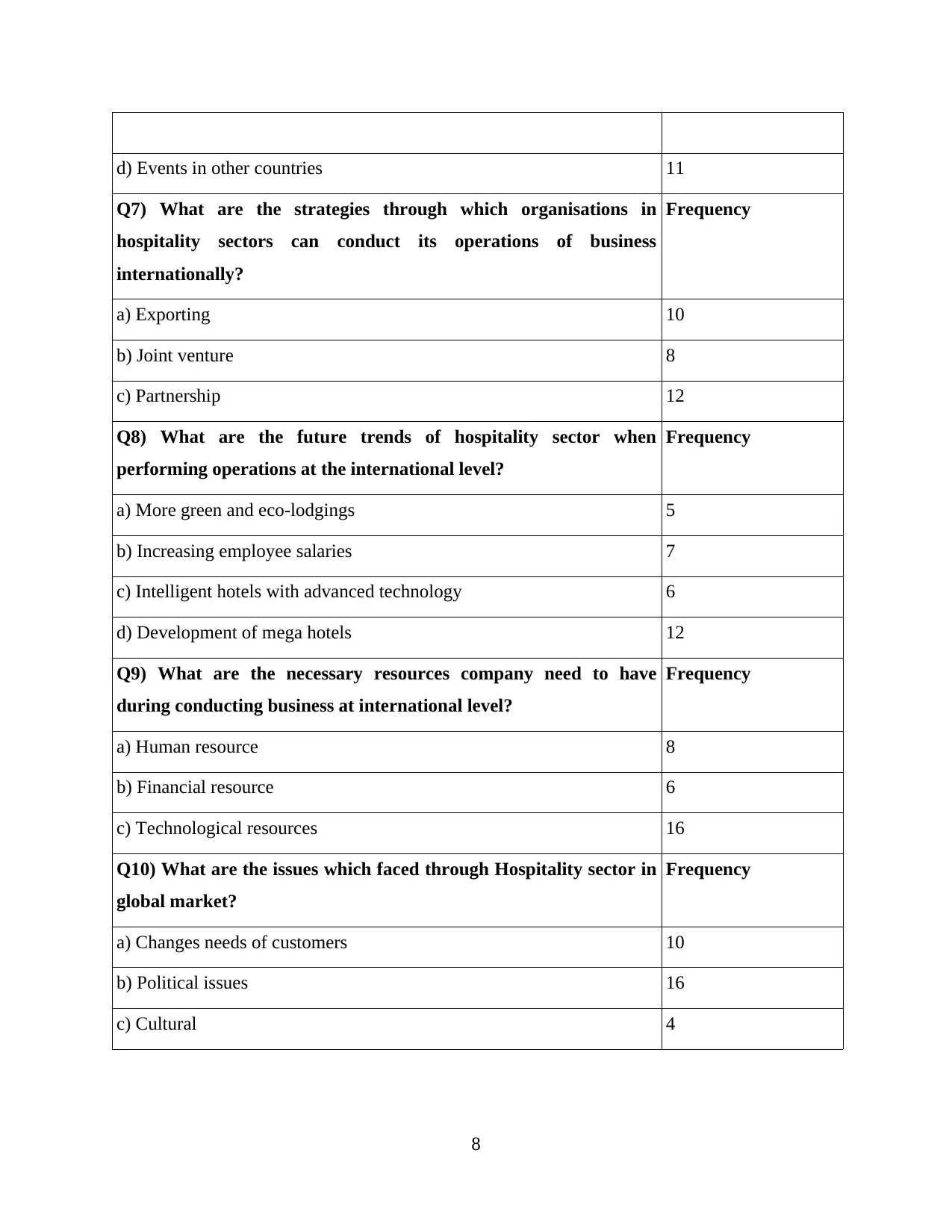
d) Events in other countries 11
Q7) What are the strategies through which organisations in
hospitality sectors can conduct its operations of business
internationally?
Frequency
a) Exporting 10
b) Joint venture 8
c) Partnership 12
Q8) What are the future trends of hospitality sector when
performing operations at the international level?
Frequency
a) More green and eco-lodgings 5
b) Increasing employee salaries 7
c) Intelligent hotels with advanced technology 6
d) Development of mega hotels 12
Q9) What are the necessary resources company need to have
during conducting business at international level?
Frequency
a) Human resource 8
b) Financial resource 6
c) Technological resources 16
Q10) What are the issues which faced through Hospitality sector in
global market?
Frequency
a) Changes needs of customers 10
b) Political issues 16
c) Cultural 4
8
Q7) What are the strategies through which organisations in
hospitality sectors can conduct its operations of business
internationally?
Frequency
a) Exporting 10
b) Joint venture 8
c) Partnership 12
Q8) What are the future trends of hospitality sector when
performing operations at the international level?
Frequency
a) More green and eco-lodgings 5
b) Increasing employee salaries 7
c) Intelligent hotels with advanced technology 6
d) Development of mega hotels 12
Q9) What are the necessary resources company need to have
during conducting business at international level?
Frequency
a) Human resource 8
b) Financial resource 6
c) Technological resources 16
Q10) What are the issues which faced through Hospitality sector in
global market?
Frequency
a) Changes needs of customers 10
b) Political issues 16
c) Cultural 4
8
Paraphrase This Document
Need a fresh take? Get an instant paraphrase of this document with our AI Paraphraser
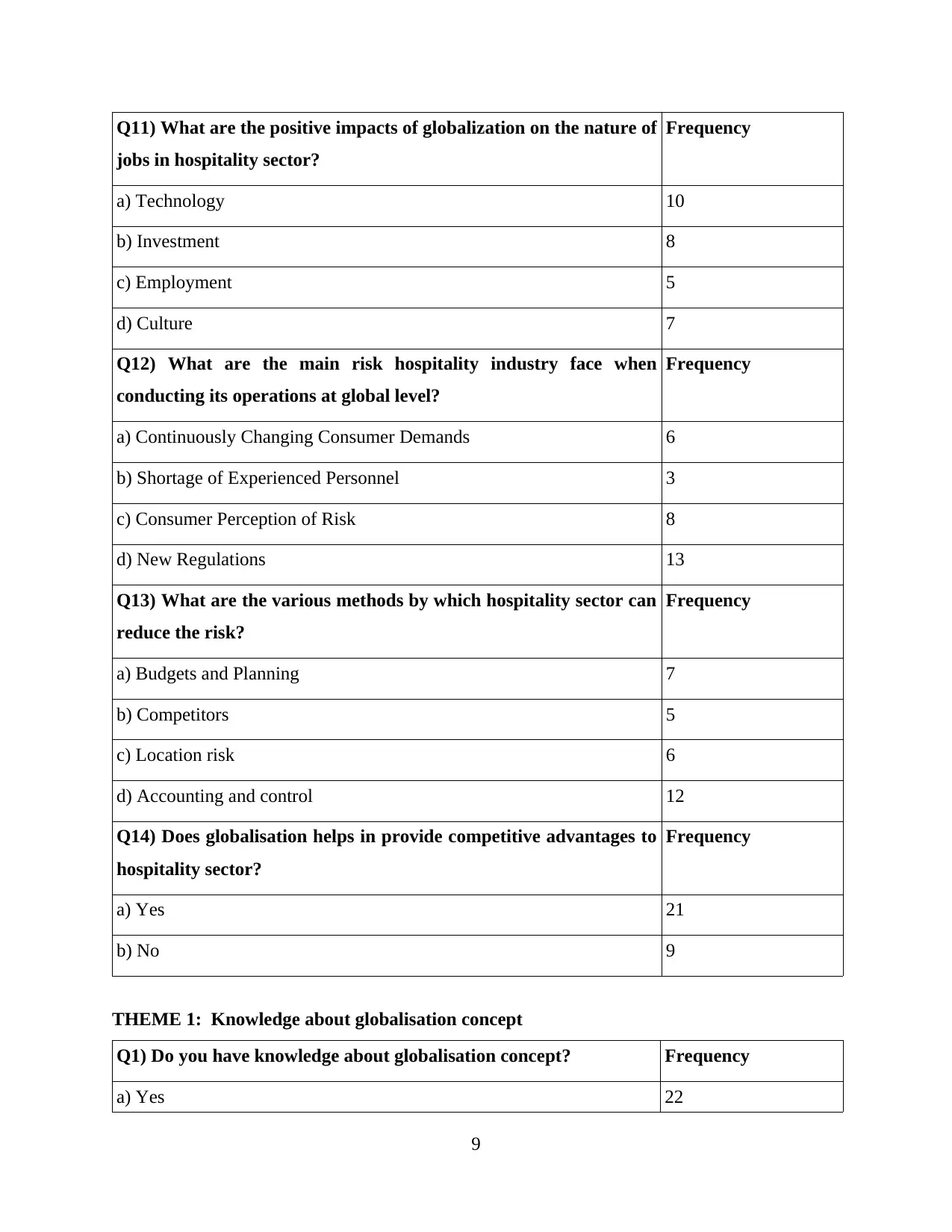
Q11) What are the positive impacts of globalization on the nature of
jobs in hospitality sector?
Frequency
a) Technology 10
b) Investment 8
c) Employment 5
d) Culture 7
Q12) What are the main risk hospitality industry face when
conducting its operations at global level?
Frequency
a) Continuously Changing Consumer Demands 6
b) Shortage of Experienced Personnel 3
c) Consumer Perception of Risk 8
d) New Regulations 13
Q13) What are the various methods by which hospitality sector can
reduce the risk?
Frequency
a) Budgets and Planning 7
b) Competitors 5
c) Location risk 6
d) Accounting and control 12
Q14) Does globalisation helps in provide competitive advantages to
hospitality sector?
Frequency
a) Yes 21
b) No 9
THEME 1: Knowledge about globalisation concept
Q1) Do you have knowledge about globalisation concept? Frequency
a) Yes 22
9
jobs in hospitality sector?
Frequency
a) Technology 10
b) Investment 8
c) Employment 5
d) Culture 7
Q12) What are the main risk hospitality industry face when
conducting its operations at global level?
Frequency
a) Continuously Changing Consumer Demands 6
b) Shortage of Experienced Personnel 3
c) Consumer Perception of Risk 8
d) New Regulations 13
Q13) What are the various methods by which hospitality sector can
reduce the risk?
Frequency
a) Budgets and Planning 7
b) Competitors 5
c) Location risk 6
d) Accounting and control 12
Q14) Does globalisation helps in provide competitive advantages to
hospitality sector?
Frequency
a) Yes 21
b) No 9
THEME 1: Knowledge about globalisation concept
Q1) Do you have knowledge about globalisation concept? Frequency
a) Yes 22
9
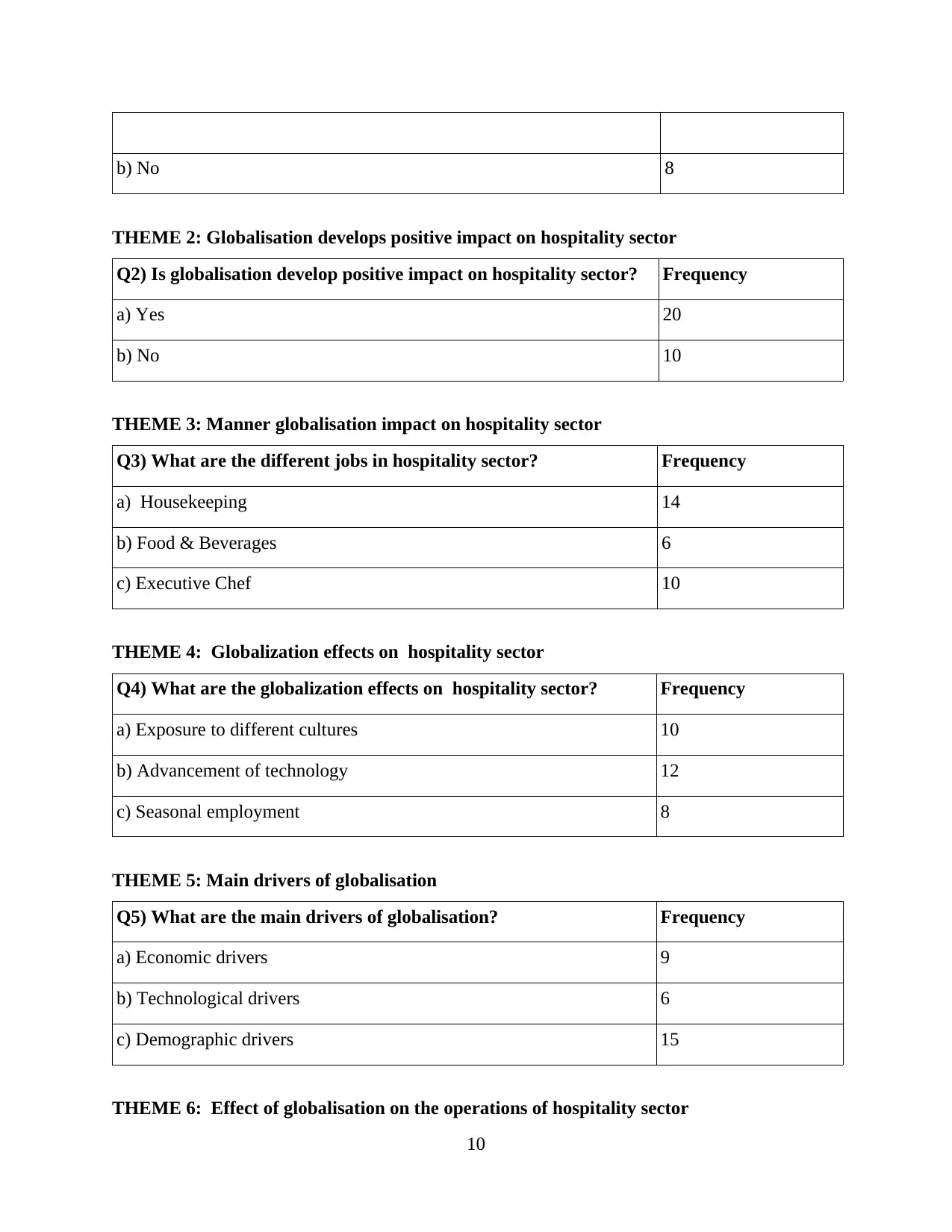
b) No 8
THEME 2: Globalisation develops positive impact on hospitality sector
Q2) Is globalisation develop positive impact on hospitality sector? Frequency
a) Yes 20
b) No 10
THEME 3: Manner globalisation impact on hospitality sector
Q3) What are the different jobs in hospitality sector? Frequency
a) Housekeeping 14
b) Food & Beverages 6
c) Executive Chef 10
THEME 4: Globalization effects on hospitality sector
Q4) What are the globalization effects on hospitality sector? Frequency
a) Exposure to different cultures 10
b) Advancement of technology 12
c) Seasonal employment 8
THEME 5: Main drivers of globalisation
Q5) What are the main drivers of globalisation? Frequency
a) Economic drivers 9
b) Technological drivers 6
c) Demographic drivers 15
THEME 6: Effect of globalisation on the operations of hospitality sector
10
THEME 2: Globalisation develops positive impact on hospitality sector
Q2) Is globalisation develop positive impact on hospitality sector? Frequency
a) Yes 20
b) No 10
THEME 3: Manner globalisation impact on hospitality sector
Q3) What are the different jobs in hospitality sector? Frequency
a) Housekeeping 14
b) Food & Beverages 6
c) Executive Chef 10
THEME 4: Globalization effects on hospitality sector
Q4) What are the globalization effects on hospitality sector? Frequency
a) Exposure to different cultures 10
b) Advancement of technology 12
c) Seasonal employment 8
THEME 5: Main drivers of globalisation
Q5) What are the main drivers of globalisation? Frequency
a) Economic drivers 9
b) Technological drivers 6
c) Demographic drivers 15
THEME 6: Effect of globalisation on the operations of hospitality sector
10
⊘ This is a preview!⊘
Do you want full access?
Subscribe today to unlock all pages.

Trusted by 1+ million students worldwide
1 out of 26
Related Documents
Your All-in-One AI-Powered Toolkit for Academic Success.
+13062052269
info@desklib.com
Available 24*7 on WhatsApp / Email
![[object Object]](/_next/static/media/star-bottom.7253800d.svg)
Unlock your academic potential
Copyright © 2020–2026 A2Z Services. All Rights Reserved. Developed and managed by ZUCOL.





